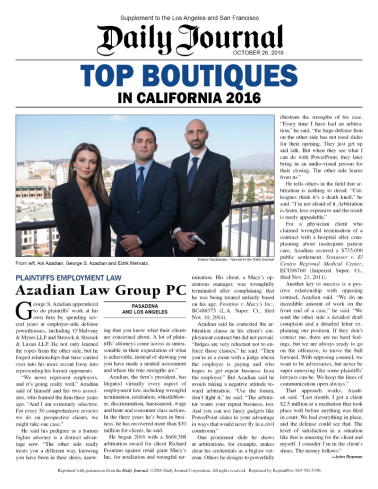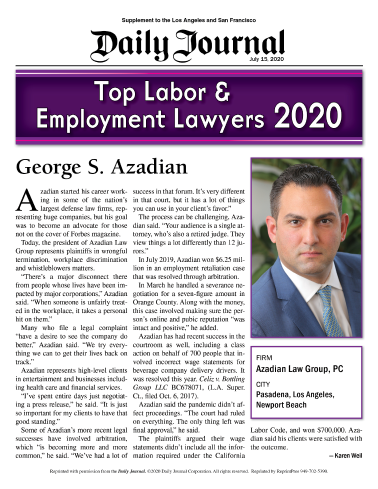Types of Discrimination in the Workplace in California
California enforces strict rules pertaining to workplace discrimination, prohibiting employers from making job-related decisions or showing favoritism based on an employee’s personal protected qualities. Unfortunately, many people in California experience various types of discrimination, some of which can be difficult to identify. As a result, it’s common for people to face adverse treatment at work without realizing they are victims of discrimination and have access to legal recourse to correct this mistreatment.
If you work in any industry in California, it is vital to understand the anti-discrimination laws that protect you. Workplace discrimination takes many forms, and you may have grounds for legal action depending on the type of mistreatment you experienced.

Racial and Ethnic Discrimination
Employers in California may not hire or fire employees based on their race, ethnicity, or national origin. Employers are also prohibited from making job-related decisions along these lines. For example, if two employees both qualify for the promotion, the employer must choose who to promote based on capability, work performance, and seniority within the organization. They cannot choose one over the other based on race or ethnic background.
Sex Discrimination
California enforces some of the most robust anti-discrimination regulations pertaining to sex and gender. Employers may not discriminate based on:
- Sex.
- Gender expression or transgender identity.
- Sexual orientation or perceived sexual orientation.
- Pregnancy.
If you are unsure whether an employer’s recent actions were discriminatory based on sex, gender expression, or sexual orientation, it’s vital to consult an experienced employment attorney as soon as possible. Employers who engage in this form of discrimination tend to use various excuses to justify their actions, but the right attorney can help you gather evidence to prove their true motivations.
Age, Health, and Medical Status
Employers may make employment-related decisions based on an employee’s age or medical condition. This includes genetic information, known and perceived disabilities, or requests for reasonable accommodations. All employers in California are required to make reasonable accommodations that allow employees with particular health concerns to perform their job duties effectively. Unfortunately, not all employees adhere to these obligations, and many employees face a wide range of problems due to age and medical discrimination. Some employees have been wrongfully terminated for requesting time off to address medical issues or exercising their rights under the Family and Medical Leave Act (FMLA).
What Qualifies as Discrimination?
Workplace discrimination is quite broad and can encompass a wide range of behaviors. Some employers are more direct than others with their discriminatory actions. For example, they may make overt hiring and firing decisions using discriminatory criteria or engage in prolonged discriminatory actions that create hostile work environments for targeted employees. Some of the most common examples of workplace discrimination in California include:
- Discriminatory hiring and firing practices.
- Refusal for promotion based on personal qualities.
- Demotion or transfer on a discriminatory basis.
- Refusal to grant reasonable accommodation.
- Chastising and ridiculing employees on a discriminatory basis.
- Creating hostile work environments for certain employees.
- Showing discriminatory favoritism or preferential treatment.
While some forms of workplace discrimination are overt and obvious, others often go unnoticed, or affected employees attribute their mistreatment to other possible causes. If you are unsure whether recent experiences in your workplace constitute illegal discrimination, it’s worth discussing your situation with an experienced attorney.
What Can I Do About Workplace Discrimination?
If you believe you have been unfairly and illegally discriminated against in your workplace, it’s vital to consult an employment attorney as soon as possible. Your lawyer can help you determine whether you have grounds for legal recourse against your employer and, if so, guide you through the process. Most discrimination cases begin with a complaint to the Equal Employment Opportunity Commission (EEOC), the government agency tasked with upholding and enforcing anti-discrimination laws in the US.
You cannot directly sue your employer for discrimination. Instead, you must file an EEOC complaint, and the EEOC must approve your claim before proceeding with a civil claim against your employer. The EEOC will review your claim and contact you for more information if necessary. Once the EEOC determines your claim is valid, they will issue a Notice of Right to Sue that allows you to proceed with a lawsuit against your employer.
FAQs
Q: Can an Employer Retaliate for Discrimination Claims?
A: Employers may take adverse punitive actions against employees who file discrimination claims, but these retaliatory actions generally make things worse for employers. If an employer is already charged with discrimination, retaliating against the employee will likely lead to more severe penalties for the employer. In addition, the employee would have more expansive grounds to seek compensation for damages such as lost income, intentional infliction of emotional distress, and more.
Q: How Do I Prove Discrimination at Work in California?
A: It can be difficult to prove discrimination, especially in a case of wrongful termination with an at-will employment agreement. The employer can simply claim they exercised their rights under at-will employment law. However, there is almost always some evidence that can prove an employer’s true intentions behind discriminatory actions. For example, email records and testimony from coworkers can potentially play essential roles in discrimination cases.
Q: What Penalties Do Employers Face for Workplace Discrimination?
A: Employers found guilty of discrimination typically face fines determined by the company’s size. Additionally, the company’s public image will be tarnished, likely discouraging talented applicants from seeking employment with the company. The employer is also liable for any civil damages to affected employees, such as lost income, lost benefits, and the employee’s emotional distress.
Q: Do I Need a Lawyer to File an EEOC Complaint?
A: Technically, you can file an EEOC complaint regarding workplace discrimination on your own without legal counsel. However, the process is complex, and it would be much easier to manage if you had an experienced lawyer on your side. In addition, the right attorney can streamline discrimination case proceedings significantly and increase the employee’s total compensation when they qualify to seek damages.
If you believe you have faced illegal discrimination in your workplace, you probably have many pressing legal questions. The Azadian Law Group, PC, can provide the meticulous and compassionate legal counsel you need in this challenging situation. Contact us today to schedule a consultation and learn more about the benefits of legal counsel for your discrimination claim in California.
Related Blog Posts
In the bustling and diverse landscape of Los Angeles, workplace discrimination poses a significant challenge for employees across various sectors....
Read MoreWorkplace discrimination is a pervasive yet often unaddressed problem, lingering like an invisible barrier between applicants and their dream jobs....
Read MoreWhich Groups Experience Workplace Discrimination Most Often in the US? Workplace discrimination is a serious issue that affects many people...
Read MoreTypes of Employment Cases We Handle in California
The following presents an overview of the broad range of employment law cases that our employment law attorneys are experienced at overseeing and favorably resolving.
Wrongful Termination
Wrongful Termination Lawyers in Los Angeles, CA Attorneys at Azadian Law Group who have filed wrongful termination lawsuits acknowledge that unfair termination can significantly impact an employee’s life. It can…
Age Discrimination
Age Discrimination Lawyers in Los Angeles, CA Azadian Law Group, PC regularly represents clients throughout Los Angeles, CA, who are the victims of age discrimination in the workplace. At Azadian…
Pregnancy Discrimination
Pregnancy Discrimination Lawyer in Los Angeles, CA Azadian Law Group, PC regularly represents clients throughout Los Angeles who are the victims of pregnancy discrimination in the workplace. The Los Angeles…
Sexual Harassment
Sexual Harassment Attorney in Los Angeles, CA The Los Angeles Sexual Harassment Lawyers at Azadian Law Group, PC know that in today’s modern era some people often make the mistake…
Racial Discrimination
Racial Discrimination Lawyers in Los Angeles, CA Azadian Law Group, PC regularly represents clients throughout Los Angeles who are the victims of racial discrimination at work. The Los Angeles Race…
Disability Discrimination
Disability Discrimination Attorneys in Los Angeles, CA There is a misconception that disabled people do not want to work or that disabled individuals simply cannot or will not be as…
Praise from Our Clients
Who We Represent
At Azadian Law Group, we are dedicated to upholding the rights and interests of employees in the workplace. Our expertise in employment law positions us as staunch advocates for those facing unjust treatment in their professional environments.
Whether combating workplace discrimination, addressing unfair termination, or negotiating equitable compensation, our team is committed to ensuring that every employee we represent is treated fairly and respectfully under the law.

Step 1
Explore our comprehensive range of legal services to find the specialized support you need.
Step 2
Arrange a free initial meeting with our experts to discuss your legal situation.
Step 3
Receive a custom strategy specially created for your case by our legal experts.
Call Us Now 213-229-9031
Tell Us Your Story
Speak out for justice. Your story can be the start of a new chapter of workplace fairness.




